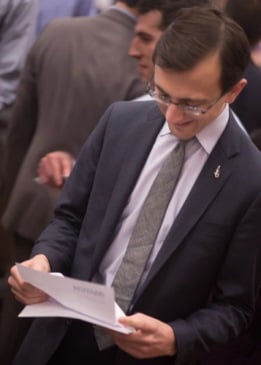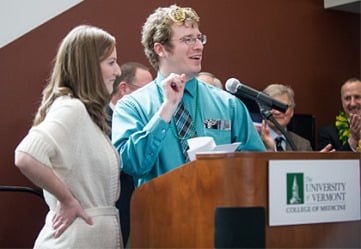The dust surrounding the 2014 National Resident Matching Program has settled, and about 94.4 percent of U.S. allopathic seniors were placed into residency positions. After the anxiety of the long wait and the joy during Match Week, students now are turning their attention toward their futures.
For those who will be relocating, practical planning such as finding housing and hiring movers are at the forefront. There’s also a sense of nostalgia.
“What’s very important to me right now is valuing the time I have left with my med school friends,” said Ross Harrison, a fourth-year medical student at the University of Florida College of Medicine who will be heading to the University of Wisconsin soon as an OB-GYN resident. “Medical school is a unique experience, and the people you share it with become very important to you.”
(CAPTION: Ross Harrison finds out his match to the University of Wisconsin during Match Day. Photo courtesy University of Florida.)
Now that these students have undergone what is arguably the most stressful time in their lives, they have some advice to pass on.
“Make the best choices for you when you make your rank list,” said Christian Pulcini, a fourth-year medical student at Tufts University School of Medicine who just matched at the Children’s Hospital of Pittsburgh. “No one is walking around in your shoes, and even people you have great respect for have underlying biases regarding any program. One of my mentors told me, ‘Do what’s best for you,’ and I really appreciate that.”
Fourth-year Michigan State University College of Human Medicine student Bradley Burmeister just matched into emergency medicine at the Medical College of Wisconsin. His advice for medical students prepping for the Match is to apply broadly to programs in their specialty.
“Self-assess your competitiveness in your specialty,” he said. “If you are concerned about not matching, consider applying to an additional specialty that might also suit you.”
Many students feel the already-stressful Match process is magnified by the timeline. From registration for the Match in September to finding out whether and where they matched in March, the wait is just too long for some.
“I believe in the Match, and I think it works better in many ways than any other system could,” said George “Bud” Vana, a fourth-year medical student at the University of Vermont College of Medicine who will head to Providence soon as part of Brown University’s Triple Board Program. “It does seem to dominate our fourth year, though. I’m not sure if there is a way to tighten up the timeframe.”
(CAPTION: George "Bud" Vana, pictured with his girlfriend, announces his match to Rhode Island Hospital/Brown University during Match Day. Photo courtesy University of Vermont.)
Pulcini said he agreed: “The long wait periods between stages of applying, interviewing, ranking and matching could be shortened. The process produces a lot of anxiety that seems unnecessary.”
No matter what, said Amy Ho, a fourth-year medical student at the University of Texas Southwestern Medical School who matched into an emergency medicine program in Chicago, “do not stress too much and have a ton of fun! This is likely the last time the entire class will be together. In the end, as long as you Match, it will all work out.”
Read more Match coverage in AMA Wire™.





